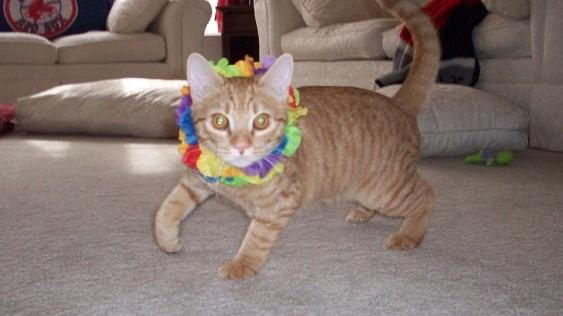Can my cat eat that?! Part 2 Grain, gluten, and greens oh my!

- posted: Sep. 14, 2019
Can my cat eat that?! Part 2 Grain, gluten, and greens oh my!
Welcome back to the next round of trying to figure out what your cat can (and cannot) eat. This month we are focusing on the ever-popular concept that your ferocious and carnivorous feline needs a vegetarian/vegan or plant-based diet. We start to walk quite the slippery slope when comparing cats to their wild relatives (lions, tigers, and jaguars), just as we do dogs to wolves. It is true that our adorable and curious housecats have been domesticated more recently than our canine companions. This means there is still some hard-wired genetic coding in cats with respect to their nutritional, behavioral, environmental, and well-being needs.
The Lion King 1994 circa, is arguably one of the best (really, THE best) movie ever made by Disney. While there are many valuable life lessons, this is one which applies to our discussion:
Mufasa: Everything you see exists together in a delicate balance. As king, you need to understand that balance and respect all the creatures, from the crawling ant to the leaping antelope.
Young Simba: But, Dad, don't we eat the antelope?
Mufasa: Yes, Simba, but let me explain. When we die, our bodies become the grass, and the antelope eat the grass. And so we are all connected in the great Circle of Life.
From an evolutionary perspective, cats are obligate carnivores, yet they need a balance of proteins, fats, and carbohydrates. Essentially, when the feline takes down the herbivore, the herbivore has a belly full of grains for the feline to ingest and utilize for all its metabolic processes. Some companies even advertise an evolutionary diet for your pet that is grain free…That seems counterintuitive. The wolf and the lion are ingesting grains aka carbohydrates to fuel their bodies for survival in the great outdoors.
Boutique, exotic, and grain free (BEG) diets are all the rage; however, they are not always necessary, much less healthy for your pet. Veterinarians and the FDA have recently released startling evidence of the consequences these diets can have on the heart health of our fur companions. Some of these diets have exotic proteins that are quite frankly, inhibiting the metabolic and physiological processes necessary for your pet to function. More specifically, the heart muscles are affected, making this crucial organ now floppy and ineffective at doing its job.
Several decades ago, cat foods were lacking an essential amino acid, taurine. Domestic cats were being diagnosed with Dilated Cardiomyopathy (DCM) – that is correct, the same heart issue we are seeing now in dogs (and cats) fed BEG diets. From a textbook perspective, DCM is usually a genetic disease which affects giant breed dogs such as Great Danes and Doberman Pinschers. Scientists and veterinarians are still conflicted regarding today’s issues – is it just the taurine? Are there other legumes in these BEG diets inhibiting heart function? Do pet foods have less organ meat, thereby making taurine less abundant in diets? Regardless of the actual cause, the evidence supports plenty of reason to NOT feed such diets to your feline friends.
Grains, gluten, and greens may be on the ingredient list of your cat’s food, but it should not be the sole ingredient source, much less the most abundant. Your kitty needs grains for energy and meat protein for basic life metabolic and physiological functions. Reputable cat foods include Hill’s Science Diet, Royal Canin, Purina Proplan, Eukanuba, and Iams. Of course, we encourage you to consult with your veterinarian for the best diet options for your pet’s health.
I always say cats do not read the same textbook as dogs. And let’s be honest, why should they? We already know they are their own purrfectly unique beings.
~Dr Nikki Waltemire >’’<
Source:
Julia Shih, VMD, DACVIM (Cardiology) – Keystone Veterinary Conference lecture notes
Location
Patton Veterinary Hospital
425 E Broadway
Red Lion, PA 17356
